This is the full, shocking story of the decade-long destruction of LGBTQ+ rights in Putin’s Russia
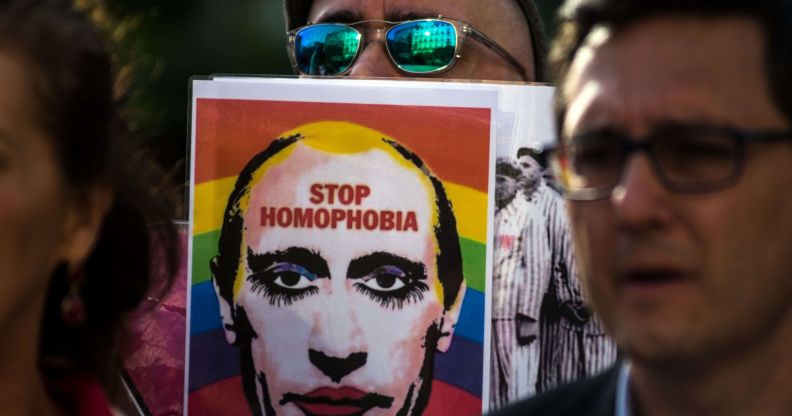
LGBTQ+ advocates worldwide have condemned Russia’s persecution of LGBTQ+ people under president Vladimir Putin. (Getty)
LGBTQ+ advocates worldwide have condemned Russia's persecution of LGBTQ+ people under president Vladimir Putin. (Getty)
On March 22 2024, Russia’s financial watchdog added the “LGBT movement” to its “terrorists and extremists” blacklist, the most recent move in a crackdown on LGBTQ+ rights in the country that has lasted over a decade.
The Rosfinmonitoring watchdog has the power to freeze bank accounts of specific entities named on the list.
This closely follows the first convictions under Russia’s new anti-LGBTQ+ law, put forward in November 2023, which declared the “international public LGBT movement” (which does not exist) to be an extremist group.
The law, which effectively criminalises all forms of LGBTQ+ activism, came into effect in January 2024.
Already, the ruling has led to arrests, police raids of gay clubs, and the shut-down of a number of LGBTQ+ rights groups. But how did the situation for LGBTQ+ people in Russia reach such a dire point?
PinkNews have been following the crackdown every step of the way, meaning we can help piece together a detailed timeline of the decade-long erosion of queer people’s rights in the country.
Here’s the full story of LGBTQ+ rights in Russia under Putin.
2013’s anti-gay propaganda law
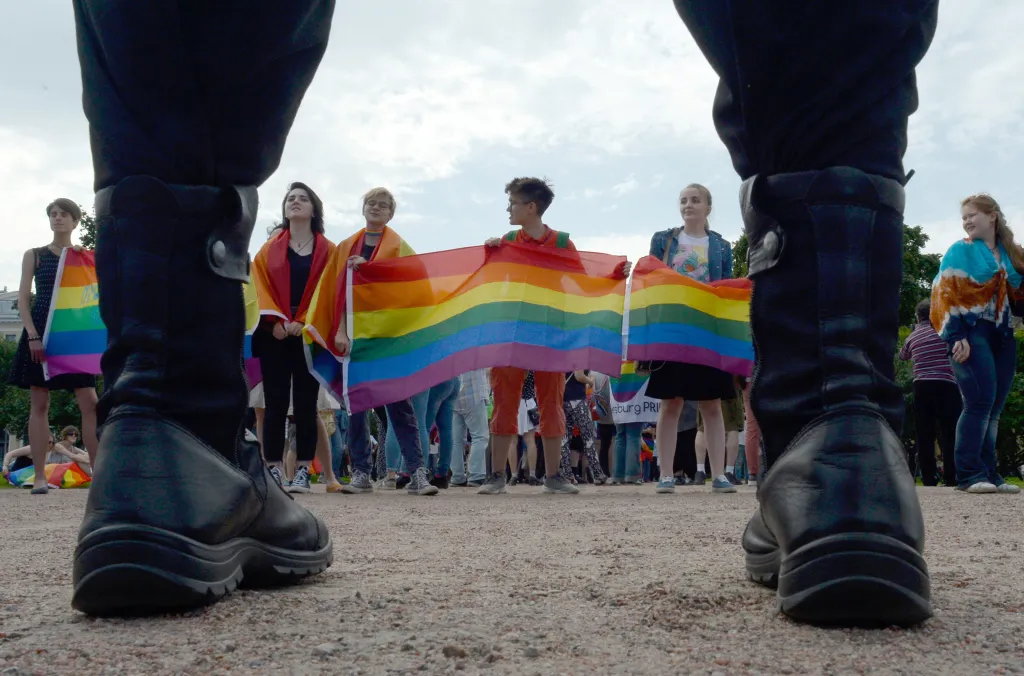
In 2013, a law officially titled “for the Purpose of Protecting Children from Information Advocating for a Denial of Traditional Family Values”, banned any public representation of non-heteronormative behaviour and relationships, sparking a wave of anti-LGBTQ+ censorship, arrests and fines that continue to this day.
A few years later, in 2017, researchers found that crimes against the LGBTQ+ community had doubled since the introduction of the “anti-gay propaganda” law. The law caused a sharp spike in violent attacks across the country, reported Reuters.
According to a prominent LGBTQ+ rights campaigner in the country, hate crimes against the LGBTQ+ community are seen “as noble deeds.”
“It seems to them that, to some extent, the government supports their actions,” said Svetlana Zakharova, a board member with Russian LGBT Network to Reuters. “Many perpetrators openly talk about their crimes as noble deeds,” she added.
2017: “Gay purge” in Chechnya
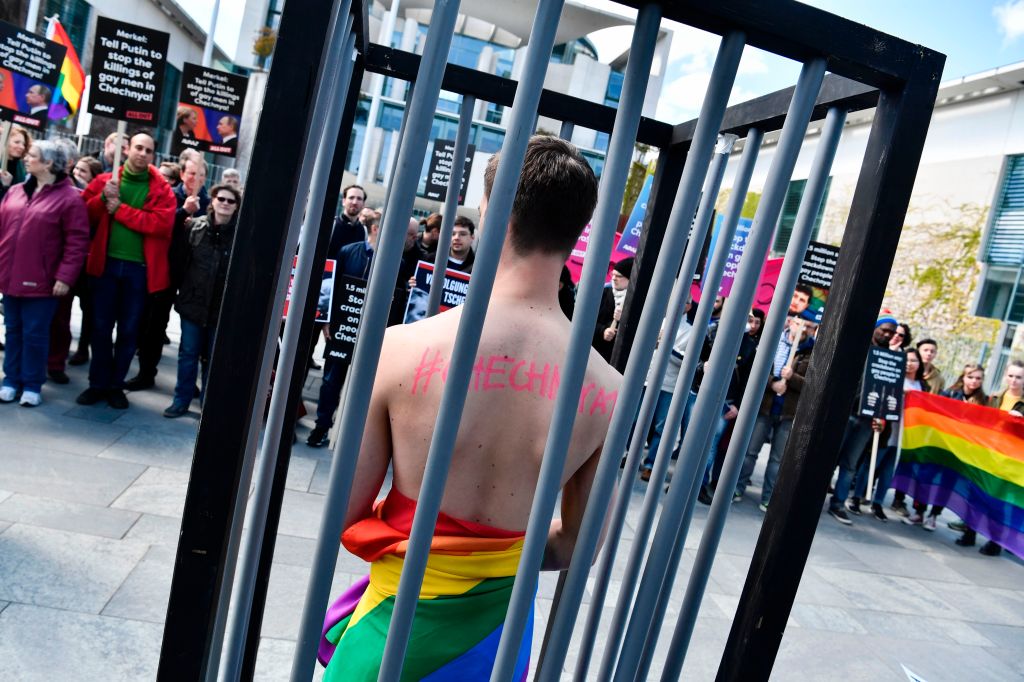
In 2007, Moscow granted the authority over the Chechen Republic to a then 30-year-old Ramzan Kadyrov. Ten years later, in 2017, a staggering number of LGBTQ+ people fled the nation after a violent purge of gay Chechen men took place.
In the summer of 2017, at least 200 gay people were held in secret prisons throughout the region, where many are reported to have been beaten and electrocuted, reported The Moscow Times.
Thirty-six people suffered “abusive treatment” in secret prisons in the North Caucasas. The abuses were said to have been “directed by the highest officials” in the state.
“They addressed me with female pronouns and demanded that I tell them the names of other gay people I knew. They threatened to kill me if I didn’t,” said one person who was arrested.
Chechnya’s leader Ramzan Kadyrov denied the attacks, stating that the republic had not purged any LGBTQ+ people because “LGBTQ+ people do not exist in Chechnya.”
His spokesman told the Interfax news agency: “Even if such people existed in Chechnya, our law enforcement agencies would not need to bother with them, because their own relatives would simply send them to a place from which they would never return.”
“Vladimir Putin and the Russian government have the final say on what happens in Chechnya. Russia has failed to conduct any meaningful investigations into the appalling abuses that took place. Nobody has been brought to justice. This is unacceptable,” said leader of the LGBT Foundation Igor Kochetkov in a statement to mark the one year anniversary of the purge.
“Religious renaissance” fuels crackdown
In 2018, LGBTQ+ couple Esenia and Anastasia spoke to PinkNews to explain why they had fled Russia for Kyiv, Ukraine.
Esenia and Anastasia had lived in a small Siberian town in Russia, in a highly religious area, which wasn’t easy – but the 2012 “gay propaganda” law led to additional hostility between them and their neighbours, as it meant that any private reservations that her neighbours once had were now validated by the state.
“There’s been such a huge religious renaissance in Russia,” said Esenia. “It’s like religion has taken everything back, and says ‘no, you can’t be like you want to be.’ The attitude first changed in the people. Whenever we mentioned our relationship, they would say, “it’s not *our* thing, it is not *our* business,” she added.
2020: Anti-LGBTQ+ sentiment spreads
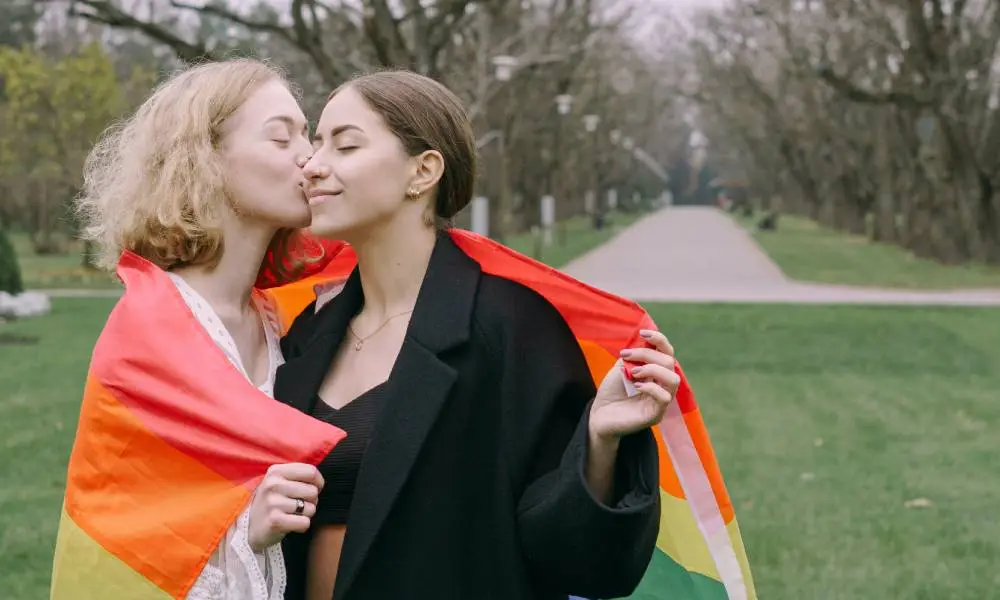
By April 2020, a shocking new survey revealed that nearly one in five people in Russia were in favour of “liquidating” or “eliminating” the entire LGBTQ+ community.
The study was carried out by Levada Centre NGO. Demonstrating views reminiscent of the Holocaust, 18 per cent of those polled stated that queer men and women should be “liquidated” or “eliminated”.
Another 32 per cent said that LGBT+ people should be isolated from society, with the same amount stating that they should be “left to deal with their own problems”.
In 2020 Russia also attempted (but failed) to legally erase trans people. Also, following the 2020 constitutional referendum, the Russian Constitution has explicitly banned same-sex marriage
2021: The crackdown continues

In February 2021, Russian police charged an activist who protested in support of jailed anti-corruption campaigner Alexei Navalny with breaching the country’s ‘gay propaganda’ law on Valentine’s Day.
According to a Novaya Gazeta report, she was charged with violating the country’s ban on ‘gay propaganda’ by posting two photos to her Instagram Story of same-sex couples kissing at a protest on 14 February.
In July, a print shop in Russia reportedly refused to print BTS greeting cards and banners for a K-pop themed cafe, insisting they were “gay propaganda”.
In August 2021, a children’s book about children with same-sex parents was published in Russia with an “18+” label, again due to the country’s reviled ‘gay propaganda’ law.
Also in August, anti-LGBTQ+ Russian MP Vitaly Milonov was reprimanded after he called for gay people to be “sterilised” and kept in shelters like cats.
In November a Moscow court fined Russian music channel Muz-TV for violating the “gay propaganda law”. The channel was reportedly fined 1m rubles after it broadcasted a man wearing a dress at an awards show as well as two men arriving at the ceremony together.
Also in November, Russian authorities reportedly investigated Netflix after a public official accused the streaming platform of violating the ‘gay propaganda’ law.
A complaint was filed by Olga Baranets, the “public commissioner for protecting families”, against the streaming service, for allegedly broadcasting LGBTQ-themed content with a “16+” rating.
2022-2024: The anti-gay law is extended
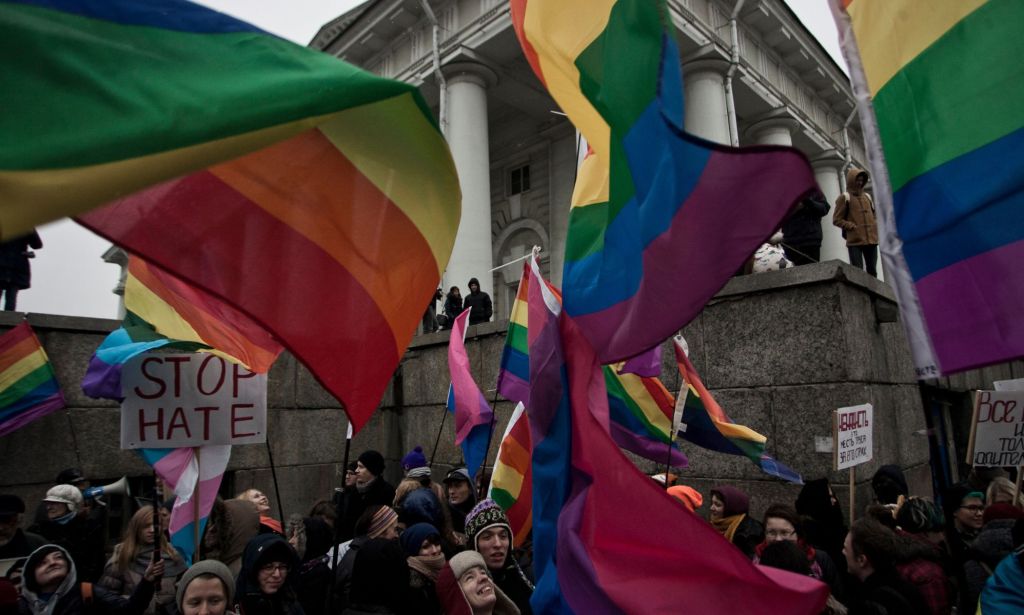
In February 2022, queer American basketball star Brittney Griner was detained in an airport near Moscow in February when security found two vape cartridges of hashish oil in her luggage. she was sentenced to nine years in a penal colony by a Russian court for attempting to smuggle illegal drugs with criminal intent. She served ten months before she was returned to the US after a prisoner exchange in December 2022.
In July 2022, Russian lawmakers proposed extending the country’s existing “gay propaganda” law to include people of all ages, rather than just being focused on “protecting children”.
The proposed amendments were signed into law by Vladimir Putin in November 2022, extending it to adults. The updated law forbade the distribution of materials that are “promoting non-traditional values, LGBTQ+, feminism, and a distorted representation of traditional sexual values”.
Fines for individuals who violate the upgraded law can go as high as 400,000 roubles (£5,466), while private companies that are in breach of the policy will be fined up to five million roubles (£68,327).
In December 2022, it was reported that Russia had granted its media regulator permission to block websites containing information about queer people and identities.
In May 2023, authorities in Russia added LGBTQ+ human rights defenders NC SOS Crisis Group to the country’s controversial ‘foreign agents’ registry: essentially, a list of organisations hostile to the Russian state.
In July 2023, Moscow approved a law that prohibits gender-affirming care for trans people, nullifies marriages where at least one partner has transitioned and makes it illegal for transgender people to adopt or foster.
Also in 2023, A gay university student was expelled after posting videos of himself in makeup online, and a queer YouTuber was arrested after uploading videos of himself with his partner.
To cap it all off, at the end of 2023, Russia’s supreme court declared all LGBTQ+ activism illegal, in a culmination of a continued crackdown on the community.
The declaration by the nation’s top court effectively outlaws LGBTQ+ activism by branding as “extremists” what it calls the “international public LGBTQ+ movement” – which does not actually exist.
Now, anyone found guilty of participating in or financing an “extremist organisation” could face up to 12 years in prison, while those found guilty of displaying extremist group symbols – which now includes the Pride flag – face up to 15 days in detention for their first offence, and up to four years in prison for a repeat offence.
2024: LGBTQ+ arrests begin in Russia
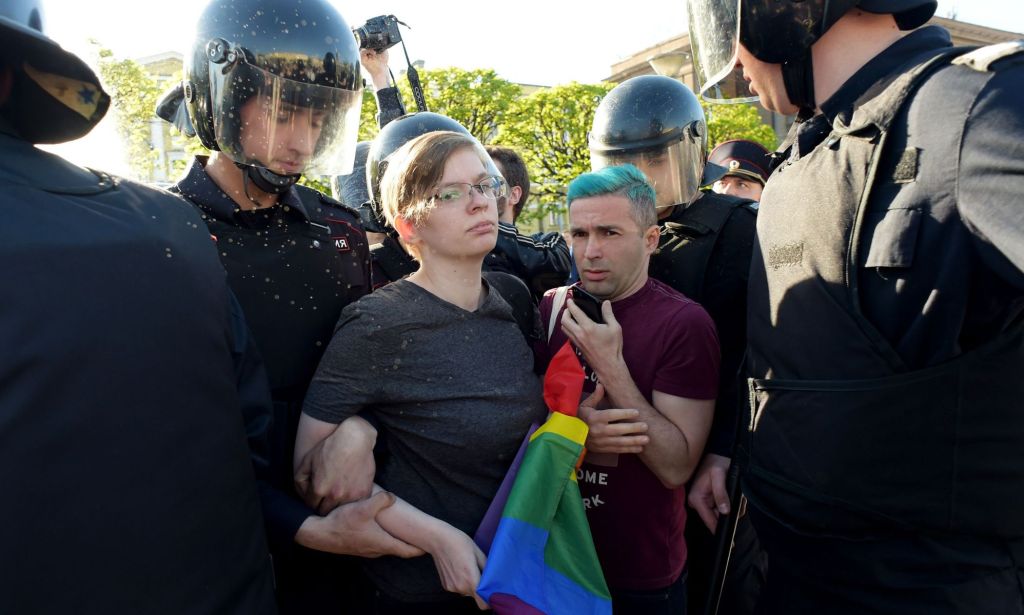
In February 2024, Human Rights Watch (HRW) reported that Russian courts have issued their first extremism convictions.
Among the recent convictions were a woman who was sentenced to five days of detention for wearing rainbow-coloured earrings, and two individuals who were fined for posting a rainbow flag on their respective social media pages.
Commenting on these first known convictions, Tanya Lokshina, associate Europe and Central Asia director at HRW said: “The Supreme Court decision opened the floodgates to allow arbitrary prosecution of lesbian, gay, bisexual, transgender, and queer people, along with anyone who defends their rights or expresses solidarity with them.
“For years, Russian authorities tried to erase LGBTQ+ visibility, and now they have criminalised it.”
In March 2024, members of staff at Pose, a gay venue in the city of Orenburg, were arrested following a police raid, footage of which appeared online and showed people being detained by officers. The pair will remain in custody until 18 May and could face up to 10 years in prison if convicted.
What’s next in this chilling saga? We’re yet to find out, but we will keep you updated every step of the way.

